SCOTUS
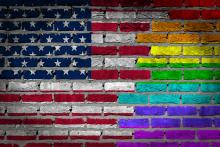
The Constitution was born within a worldview hospitable to transformation and open to corrections of injustices in letter and spirit. Examples abound: women’s right to vote, interracial marriage, the right to open legislative deliberations with prayer, and the right to education without segregation.
The Constitution has never claimed to be, in itself, the last word. Rather, it has claimed to be the first.
While I will not propose that every decision the Supreme Court has made has been for the betterment of all people, today’s ruling on same-sex marriage is an example of a nation reforming itself for the better.
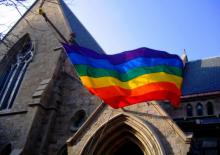
Following the Supreme Court’s ruling today that “same-sex couples may exercise the fundamental right to marry in all States,” many wondered how Christian leaders in the U.S. would react.
But despite lingering stereotypes, many religious folk in the U.S. are now supportive of same-sex marriage. In fact, a recent survey found that “among religiously affiliated Americans, supporters today actually outnumber opponents.”
Below, read some of the responses from Christian leaders — including evangelicals, Catholics, and Protestants — who have expressed their joy and support for today’s Supreme Court ruling, as well as the work left to be done towards full LGBTQ inclusion in our nation and churches.

The debate is over.
In a landmark decision, the Supreme Court decided this morning that marriage was a fundamental right for all couples regardless of gender. All Americans who wish to can now marry the same-sex partner they love. Every state law that bans such marriages is now dead. And it is over. It is finished. This debate, at long last, is done.
This is a good day to be present. I want to document this day into my memory, so I might tell my children about it later. Although at 25 I can’t possibly understand all this decision entails, there may be a day down the road when I stand tuxedoed and teary-eyed and holding the hands of another, and I want this memory to color that moment. I want to feel the gift of it.
But this day also brings up a lot of complicated feelings for me, too. I am, after all, a follower of Jesus, and many in this family of Christians are not celebrating with me. They are unsure of what to say, uncertain of what the future holds.

When I reached high school and started dating, my relatives had a lot of questions: "This girl you’re going to the movies with: Is she Catholic? Slovak? What’s her family’s last name? What does her father do for a living?"
She had to be Catholic, of course. Preferably Slovak. If not, some other nearby nationality. Anything less would get disapproving comments. Those questions may sound odd now, but they mattered back then. The Catholic Church had only recently concluded Vatican II, which tried to bridge centuries of animosity between churches. Accepting Protestants as equals was something new. And many of the immigrants in my neighborhood were trying to preserve the culture and traditions that they brought from Europe. They were afraid of losing their heritage in the new land.
For them, traditional marriage meant choosing someone from the same faith, the same ethnic background. Simply put, they were afraid. Terrified, actually. They feared that if marriage changed, their world would fall apart.
That's why to so many people, my relationship wasn’t about finding someone who fit me — it was more about me finding someone who fit them.
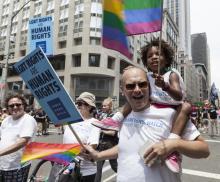
By the end of June — and as early as next week — the Supreme Court is expected to rule on the legality of gay marriage nationwide. In a pre-emptive move to refocus narrative and legislative control at the state level, two states this week enacted laws designed to protect religious objection to same-sex couples. Here's how.

This extravagant love poured out on my behalf felt like an offer of grace from God, a reminder that though the man I had dated couldn’t love me as I should be loved, God would make up for the rest. It was a convicting moment — I have often viewed this type of love and friendship as a consolation prize for not having a significant other. What a small way to live and love when you only expect love from spouse and children and see the love of friends and family as lesser. How could such a small group of people really show all the wonder and magnitude of God’s unfailing love toward us?
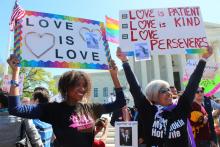
WASHINGTON — As the nine Supreme Court justices took up the vexing question of a constitutional right to same-sex marriage on Tuesday, the case came down to two competing visions of marriage: what it’s been, what it should be, and who gets to decide.
Outside the court, hundreds of demonstrators echoed both sides: Amateur evangelists and anti-gay zealots with signs proclaiming, “Man & Woman: United for Life, Open to Life,” and throngs of gay rights supporters chanting “Love Must Win!” to drown out the sidewalk preachers with their megaphones.
Yet ultimately, beyond both the arcane and real-life arguments over the state’s sanction of private relationships, the court must decide the very nature and purpose of marriage — or at least which nature will be reflected in civil law.

An Atlanta woman’s scheduled execution was given an 11th-hour delay yet again — this time by the Department of Corrections late Monday evening.
Kelly Gissendaner, convicted in 1998 of conspiring to and abetting in murder of her then-husband, Doug, faced execution at 7 p.m. EST on Monday. Her original execution — scheduled for the evening of Feb. 25 — was delayed due to weather. After several appeals for clemency were denied by the Georgia Board of Pardons and Paroles and the Georgia Supreme Court, Gissendaner’s lawyers petitioned the Supreme Court to hear her appeal and to issue a stay in the meantime.
Though there has yet been no word from the Supreme Court, the request for delay was honored — at least in part. According to CNN, the execution is on hold due to the cloudy appearence of the drugs prepared for the execution.
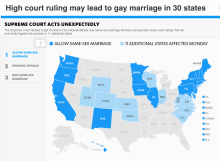
On Monday, the Supreme Court declined to hear several cases where federal appeals courts upheld the Constitutional rights of same-sex couples to marry, causing a seismic, if quiet, shift in several states' debates over same-sex marriage. The decision to not hear cases leaves intact lower appeals rulings that had overturned same-sex marriage bans. For five states and potentially six more, this guarantees the legal right for same-sex couples to marry.
USA Today reports:
The unexpected decision by the justices, announced without further explanation, immediately affects five states in which federal appeals courts had struck down bans against gay marriage: Virginia, Indiana, Wisconsin, Oklahoma and Utah.
It also will bring along six other states located in the judicial circuits overseen by those appellate courts: North Carolina, South Carolina, West Virginia, Colorado, Kansas and Wyoming. Lower court judges in those states must abide by their appeals court rulings.
Read more here.

It is an identical claim to moral superiority which matters and which is in fact the cause of the apparent conflict. The underlying issues, whatever you think they may be, whether religious freedom, women’s reproductive rights, creeping restrictions on abortion or loosening of civil rights protections—all these issues are things we can talk about and solve together through discussion and compromise. ...Unless we begin from a position that says, "We refuse to talk with you or compromise."
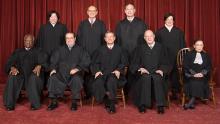
Five things to know about one of the most anticipated Supreme Court decisions of the year:
1. Corporations can’t pray, but they do have religious rights.
Hobby Lobby isn’t a person. It’s a chain of crafts stores owned by a religious family. And though the evangelical Green family objects to parts of the Affordable Care Act’s emergency contraception mandate, it’s not the Greens but the company that writes the check for employees’ health insurance. The first question the justices had to answer was this: Does Hobby Lobby have religious rights? To many Americans, this sounds a little nutty. Does a craft store believe in God?
A majority of the justices held that a closely held company such as Hobby Lobby does have religious rights. The court didn’t apply those rights, however, to publicly held corporations, where owners’ religious beliefs would be hard to discern.
But well before the justices had delivered their verdict on this question, many legal scholars said they wouldn’t be surprised were they to affirm the company’s religious rights. American corporations do have some of the rights and responsibilities we usually associate with people. And in the 2010Citizens United campaign finance case, the justices overturned bans on corporate political spending as a violation of freedom of speech — corporations’ free speech.
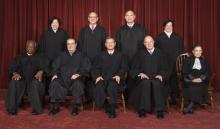
After two blockbuster terms in which it saved President Obama’s health care law and advanced the cause of same-sex marriage, the Supreme Court appears poised to tack to the right in its upcoming term on a range of social issues, from abortion and contraception to race and prayer.
The justices, whose term begins Monday, could rule against racial minorities in two cases and abortion rights in one or two others. They also could uphold prayers at government meetings, ease restrictions on wealthy political donors, strike down federal environmental regulations, and take a first bite out of Obamacare.
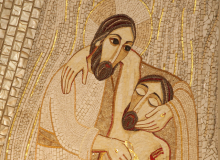
In recent weeks, a number of controversial and divisive political questions have dominated the news. Race and voting rights, abortion in Texas, and marriage equality at the Supreme Court have opened anew the scars of old political and cultural wars.
In this conflicted political ambit, the Samaritan's bold compassion is a needed reminder today. Let’s remember to be kind to the stranger, certainly. But just as important is that the story of the Good Samaritan also invites us to imagine ourselves in a different part of this narrative.
Imagine yourself not as the Samaritan seeking to love God and neighbor. Imagine yourself as the person in need. A man on the brink of death. A woman in deepest grief. A man lost in the world. A woman with no hope. Imagine yourself at your most vulnerable, deep in despair with only one hope: perhaps someone will help me.
“DOMA is dead.”
Such were the chants heard outside the United States Supreme Court yesterday when it was announced that the highest judicial body in the nation voted 5-4 to strike down the Defense of Marriage Act (DOMA). That’s right. As of yesterday, there is no longer a federal law defining marriage as a union between a man and woman.
Of course, not every American is roundly rejoicing. Responses from the Christian community, which has become more divided over the issue in recent years, are mixed. Conservative Christians seem mostly despondent while the progressives among them are mostly celebrating. I spoke with several prominent Christians from across the political spectrum today to get their reactions to the Court’s decision:
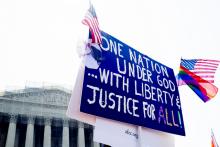
The words above the Supreme Court read, “Equal Justice Under the Law.” This week, two Supreme Court outcomes dramatically affected the reality of those words.
On Tuesday, in a 5-4 decision, a key component of the historic Voting Rights Act of 1965 was struck down, jeopardizing equal justice under the law especially for black, Hispanic, and low-income people whose voting rights have historically been assaulted and have continued to be suppressed as recently as the 2012 election. In fact, Section 4 of the Voting Rights Act — which required parts of the country that have been especially egregious in racially motivated voter suppression to get federal approval of any changes in their voting laws — was specifically used in the 2012 election to prevent new voter suppression. That provision has now been struck down, and efforts to increase barriers to voting are already underway in several states, especially in the South, that would suppress the future votes of Americans of color, especially those with lower incomes.
Equal justice under the law lost on Tuesday, June 25. The Supreme Court’s decision was morally shameful. ...
Contrast Tuesday’s decision with the final ones we saw handed down this week. ... I, along with a growing number of people in the faith community, believe that equal protection under the law is essential for our gay and lesbian friends and family members. While some Christians are conflicted about the theological issues involved, or even are unable to support homosexuality on a religious basis, they also don’t want churches to be the ones standing in the way of civil rights.

In the Methodist tradition in which I was I raised, there is a concept of perfection. We “strive for perfection” in loving each other and loving God. It is not about avoiding all mistakes. It is about growing in love for neighbor and being hospitable to all we come in contact with. This is the point of our theology: as we grow in faith and love, we become closer to God. In the end, resisting God’s call to love others is pretty hard to do.
And yet we know not everyone we meet is irresistible. We all have moments when some folks are harder to love than others. Sometimes those we find difficult to love are members of our own families. Other times they are friends we’ve had a conflict with. And for some of us, they are hard to love simply because of whom the other person loves.

On Tuesday, the Supreme Court struck down part of the Voting Rights Act that was enacted in 1965 to root out racial discrimination in voting. The specific section of the Act that was stricken — Section 4 — set forth a formula for determining which jurisdictions need federal clearance before making even minor changes to voting procedures. The impact of striking Section 4 is that the most important part of the Act, Section 5, is now rendered useless. Section 5 provides that states, cities, and counties with a history of racial discrimination in voting must “pre-clear” changes to voting procedures with the Department of Justice or a special court in Washington, D.C. Without the formula in Section 4 to determine which states, cities, and counties the preclearance should apply to, the preemptive protection provided by Section 5 no longer exists, and any future challenges to changes in voting procedure must happen after such changes are already in effect.
The majority of the Court felt that racial minorities do not continue to face discriminatory voting practices, and that the preclearance requirement was based on 40-year-old facts that had no logical bearing on present day. Chief Justice Roberts, Jr., wrote:
“Our country has changed. While any racial discrimination in voting is too much, Congress must ensure that the legislation it passes to remedy that problem speaks to current conditions.”
The practical application of Tuesday's decision is that states will be able to enact potentially discriminatory laws that previously had been blocked. This was made immediately apparent in Texas, which announced after the ruling that voter identification laws would go into effect immediately.
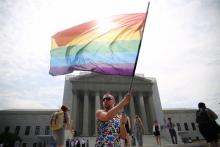
The Supreme Court this morning struck down the Defense of Marriage Act, 5-4, which prohibits the federal government from recognizing same-sex marriages performed in states.
From the opinion:
"DOMA violates basic due process and equal protection principles applicable to the Federal Government. The Constitution’s guarantee of equality 'must at the very least mean that a bare congressional desire to harm a politically unpopular group cannot' justify disparate treatment of that group."
Read the full opinion here.
Following the court's announcement, President Barack Obama Tweeted his support.
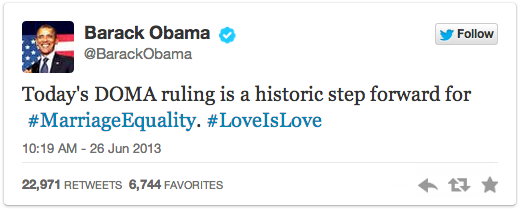
The Washington Post reports:
“The federal statute is invalid,” wrote Anthony Kennedy in his majority opinion, “for no legitimate purpose overcomes the purpose and effect to disparage and to injure those whom the State, by its marriage laws, sought to protect in personhood and dignity.”
Read more here.
Also on Wednesday, in another 5-4 decision, the Court ruled that the appeal to the lower court's decision overturning California's Proposiion 8 — the state ballot measure that ruled that only marriage between a man and a woman would be recognized — had no standing, in effect, allowing same-sex marriage to continue on the state.
Read the opinion here.

In a vote of 7-1 on Monday, the Supreme Court sent an affirmative action case, Fisher v. University of Texas, back to the lower court for a re-hearing, while reaffirming the benefits of diversity in institutions of higher learning and authorizing the continued use of race as one factor in admissions. By sending the case back to determine if the University of Texas could find no “available, workable race-neutral” alternatives available to them, Justice Ruth Bader Ginsberg explained the court did not issue a strong enough support for affirmative action. I agree. By virtue of our nation’s not-so-distant history, race simply is a factor that should be considered.
For nearly 250 years, blacks were bought and sold like cattle and carriages on auction blocks across America. When the Atlantic slave trade was outlawed in 1807, the U.S. bred slaves to reinforce the fundamental source of its wealth: free labor. When shackles fell from the wrists and legs of black men, women, and children — and the Reconstruction Era took hold — black families thrived and held public office. Then, for the next 80 years, thousands of white men in the South covered their faces with sheets, burned crosses, lynched 3,445 black men, women, and children, and instituted a web of laws that made it nearly impossible for blacks to vote, attain equal education, or own a home of much worth. At the same time in the North, blacks, Latinos, and Asians were redlined into urban ghettos where access to good housing, competitive education, adequate health care, effective law enforcement, and gainful employment was scarce.
When did this reign of terror against African-Americans end? The Civil Rights Act of 1964 and Voting Rights Act of 1965 outlawed so-called “Jim Crow” laws that had blocked blacks from voting and legally reinforced racial segregation. The acts laid the foundation for legal recourse against all manner of discrimination from that day to present.
Now consider this: We have made only two generations of progress after 17 generations of comprehensive, structural, systematized, and racialized oppression. And the effects of that oppression still haunt us today.

This week the U.S. Supreme Court is expected to hand down decisions on two significant cases for same-sex marriage: United States v. Windsor (regarding the Defense of Marriage Act, or DOMA), and Hollingsworth v. Perry (regarding California’s Proposition 8).
At the Supreme Court this morning, an expectant crowd gathered hoping to catch the decisions firsthand. Most in attendance were visibly supportive of same-sex marriage, and many were cautiously optimistic that the Court would strike down DOMA, Proposition 8, or both.
See our slideshow and interviews with those gathered at the Supreme Court, below.